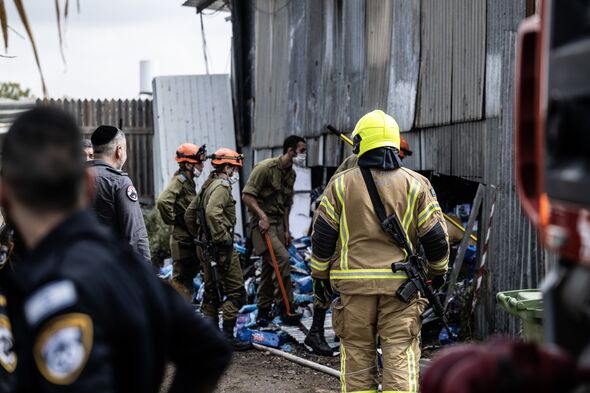Hamas defiantly fired rockets into Israel today – as the one year anniversary of the October 7 attacks was marked around the world.
As Jerusalem’s forces also launched further deadly attacks both in Gaza and on the Lebanese capital Beirut, Jewish people across the globe remembered the 1,200 Israelis killed in the initial attack which began the conflict.
But Hamas was clearly intent on showing yesterday that it was far from defeated, despite Israel having killed more than 40,000 Palestinians in the war-torn Strip since the deadly incursion last October.
Air raid sirens were heard in Tel Aviv as the terror group launched a number of rockets into southern Israel.
Hamas’s military wing, al Qassam Brigades, said it had sent a “barrage” of rockets in a bid to bombard the city.
It added that the attack was in response to the “massacres against civilians and the deliberate displacement of our people”.
The Israel Defence Forces (IDF) said “five projectiles” were fired from Khan Younis in southern Gaza.
The Israel ambulance service said it was treating two women with shrapnel injuries following the attack.
It added that teams were at several sites “treating a number of people injured while seeking shelter or with anxiety problems”.
But as the year long anniversary of the October 7 attacks was marked, Israeli forces were also once again on the offensive.
The IDF carried out further air strikes in Gaza and the Lebanese capital of Beirut.
In Beirut, there were huge explosions in the southern suburbs – Israel says it hit Hezbollah weapons storage facilities.
Lebanese MP Melhem Khalaf, part of a reformist bloc in parliament, said the city was again “under heavy attack”.
“There was no proportionality in the response of Israel to what is considered as attacks from Hezbollah,” he said.
“Bombing civilians, destroying entire villages, bring down to earth hundreds of houses and buildings, killing innocents in its attempt to assassinate whomever Israel considers a terrorist.”
Overnight, Israel said it struck Hezbollah weapons and storage facilities in Beirut, setting off secondary explosions.
Meanwhile, in Gaza, the IDF said it also hit targets throughout the strip, including a hospital it claimed was being used by Hamas fighters.
It said it carried out the strike on Hamas members who were operating inside the al-Aqsa hospital in Deir al-Balah in the central Gaza Strip.
The IDF said these command and control centres were used by Hamas to plan attacks against IDF troops in Israel.
It added that it had taken steps to protect civilians before the strikes, including the use of “precise munitions, aerial surveillance, and additional intelligence information”.
The IDF said it was a “further example” of Hamas’s “systematic abuse of civilian infrastructure in violation of international law”.
But as the violence continued unabated, there were one year anniversary commemorations for the 1,200 Israelis killed by Hamas in the initial attack on October 7.
In Israel, there were emotional scenes as many returned to the site of the Supernova festival in Re’im, southern Israel, where more than 350 people were killed by Hamas a year earlier.
The last song before the attackers struck was replayed as those gathered prayed and sobbed.
Grief-stricken relatives held up pictures of those who had been at the festival.
The president of Israel, Isaac Herzog, also attended and released a statement saying the world “must support Israel” if it wants to bring peace and “a better future” to the region.
Last year’s 7 October attacks saw Hamas killed about 1,200 people and take 251 hostage.
Since then, nearly 42,000 people have been killed during Israel‘s campaign in Gaza, according to the Hamas-run health ministry.
Another hostage death was announced today. Idan Shtivi, one of those taken by Hamas from the Supernova music festival on 7 October last year, is understood to have been killed during the attacks, the Hostages and Missing Families Forum has just announced.
The group, which aims to return those abducted back to Israel, said the 28-year-old was “known for his selflessness and willingness to sacrifice for those around him”.
It added that when the attack began, Shtivi made a “selfless choice” to help two strangers escape from the site, but their car was attacked along the route. The bodies of two of his passengers were found.
Shtivi’s body is “still being held captive by Hamas”, the group added.
Before Shtivi’s death was announced, 117 of those taken hostage had been freed, 37 confirmed dead, and 97 remained unaccounted for, with 64 of those assumed to be alive.
